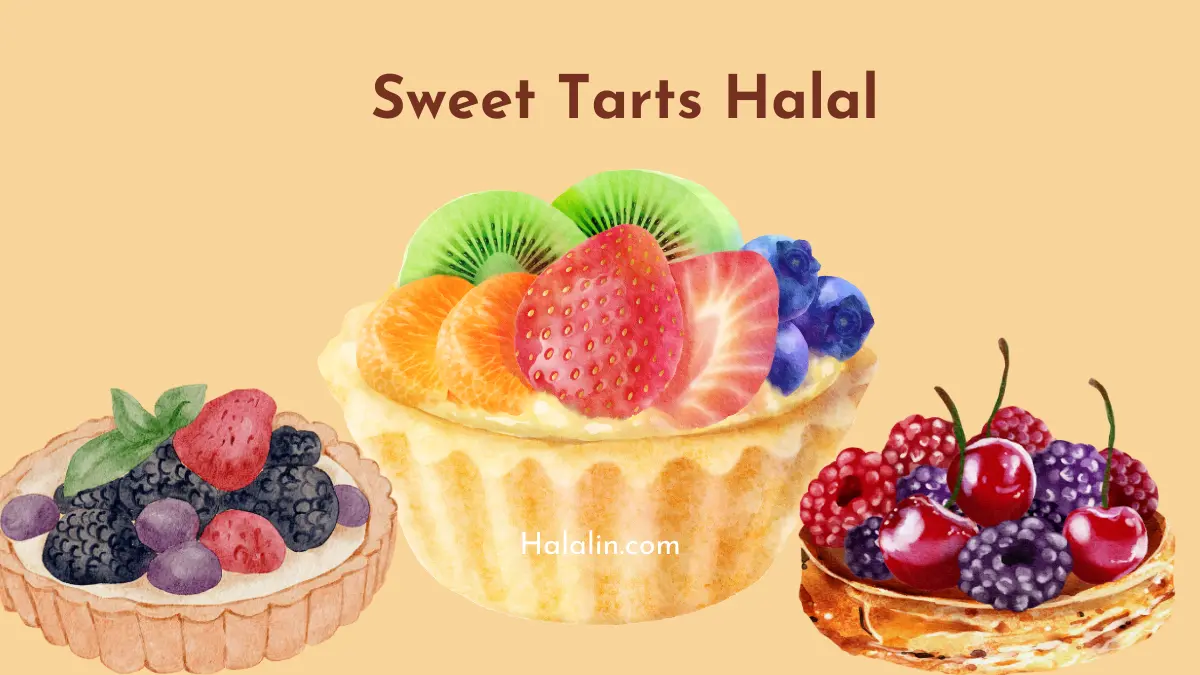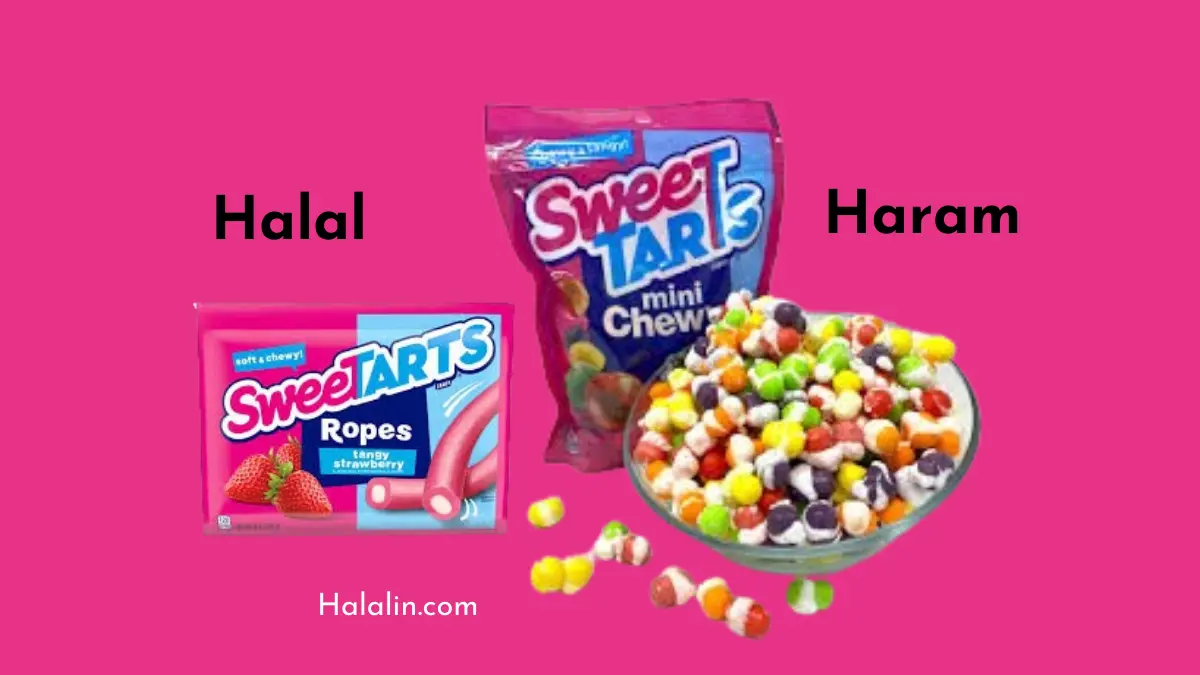In today’s globalized world, the availability of various food products has expanded significantly. For Muslims, this presents both opportunities and challenges, as it is crucial to ensure that the food they consume adheres to Islamic dietary laws. One such product that often raises questions is Sweet Tarts. These colorful, tangy candies are popular among children and adults alike. However, many wonder, “Is Sweet Tarts halal?” This blog post aims to provide a comprehensive analysis of Sweet Tarts, examining their ingredients, referencing Islamic teachings, and offering insights from scholars to determine their halal status.
Introduction of Sweet Tarts
Sweet Tarts, a beloved candy brand, has been around since the 1960s. Known for their sweet and tangy flavors, Sweet Tarts are a favorite treat for many. They come in various forms, including chewy candies, hard candies, and even gummy varieties. The brand has expanded over the years, introducing new flavors and textures to cater to a broad audience.
Ingredients of Sweet Tarts
To determine whether Sweet Tarts are halal, it is essential first to understand their ingredients. The specific ingredients can vary depending on the type of Sweet Tarts, but generally, they include:
- Dextrose
- Maltodextrin
- Corn Syrup
- Hydrogenated Coconut Oil
- Citric Acid
- Calcium Stearate
- Natural and Artificial Flavors
- Colors (Red 40 Lake, Blue 1 Lake, Yellow 5 Lake, Yellow 6 Lake)
- Carnauba Wax
Is Sweet Tarts Halal?
Yes Sweet Tarts is Halal. The halal status of a product is determined by examining its ingredients and the processes involved in its production. For Sweet Tarts, several ingredients may raise concerns among those seeking halal products, particularly the use of artificial flavors and colors, as well as calcium stearate. Calcium stearate, in particular, can be derived from animal fats, which may be a concern if the source is not halal.

Ingredient Analysis of Sweet Tarts
Dextrose and Maltodextrin
Both dextrose and maltodextrin are types of sugar derived from corn. These ingredients are generally considered halal as they are plant-based.
Corn Syrup
Corn syrup is another plant-based ingredient commonly used in candies. It is also considered halal.
Hydrogenated Coconut Oil
Hydrogenated coconut oil is derived from coconut, a plant-based source, making it halal.
Citric Acid
Citric acid is typically derived from citrus fruits or through fermentation processes. It is considered halal.
Calcium Stearate
Calcium stearate can be derived from both plant and animal sources. If it is plant-based, it is halal. However, if derived from animal fats, it must come from a halal animal slaughtered according to Islamic law to be considered halal.
Natural and Artificial Flavors
Natural and artificial flavors can be tricky, as their sources vary widely. Some flavors may be derived from non-halal sources. Without specific information about these flavors in Sweet Tarts, it is challenging to definitively determine their halal status.
Colors
The colors used in Sweet Tarts (Red 40 Lake, Blue 1 Lake, Yellow 5 Lake, Yellow 6 Lake) are synthetic and typically considered halal. However, concerns arise regarding the use of certain processing agents in their production.
Carnauba Wax
Carnauba wax is derived from the leaves of the carnauba palm and is considered halal.
References to Quran and Hadith
Islamic dietary laws are derived from the Quran and the Hadith. The Quran states, “O mankind, eat from whatever is on earth [that is] lawful and good…” (Quran 2:168). Additionally, the Prophet Muhammad (peace be upon him) emphasized the importance of consuming halal and tayyib (pure) food.
Opinions of Scholars
Islamic scholars have varying opinions on processed foods and candies like Sweet Tarts. Some scholars argue that if there is doubt about the source of an ingredient, it is better to avoid it, following the principle of avoiding doubtful matters. Others believe that if the majority of the ingredients are halal and there is no clear evidence of haram substances, the product can be considered permissible.
How Can Sweet Tarts Be Halal?
To ensure Sweet Tarts are halal, manufacturers would need to:
- Verify the sources of Calcium Stearate and ensure it is plant-based or from halal-slaughtered animals.
- Ensure that artificial colors and flavors are free from haram substances.
- Obtain halal certification from recognized authorities to provide assurance to Muslim consumers.
Is Sweet Tarts Halal Alternative
For those seeking halal alternatives to Sweet Tarts, there are several options available. Many companies now produce candies that are specifically labeled as halal, ensuring that all ingredients and processing methods comply with Islamic dietary laws. Some popular halal candy brands include:
- Ziyad Candy
- Al-Amir Halal Sweets
- Candy Funhouse Halal Candy Collection
These brands offer a variety of sweet and sour candies that provide a similar taste experience to Sweet Tarts without the uncertainty regarding their halal status.
Summary
The question of whether Sweet Tarts are halal depends on the sources and processing of specific ingredients. While many components are inherently halal, concerns about Calcium Stearate and certain artificial additives raise doubts. Muslims seeking to adhere strictly to halal dietary laws should consider these factors and look for halal-certified alternatives. As always, it is advisable to consult with knowledgeable scholars or halal certification bodies for the most accurate guidance.
Frequently Asked Questions
1. Are all Sweet Tarts halal?
Not necessarily. The halal status of this product depends on the sources and processing of their ingredients.
2. What ingredients in Sweet Tarts are of concern for Muslims?
Calcium Stearate and certain artificial colors and flavors are the primary concerns.
3. Are there halal-certified alternatives to this?
Yes, several companies produce halal-certified candies that are similar in taste and texture to Sweet Tarts.
4. Can Muslims eat Sweet Tarts if they are unsure of the ingredients?
It is advisable to avoid doubtful matters and seek halal-certified products to ensure compliance with Islamic dietary laws.
5. How can I find out if a product is halal?
Look for halal certification from recognized authorities and consult knowledgeable scholars or halal certification bodies for guidance.

